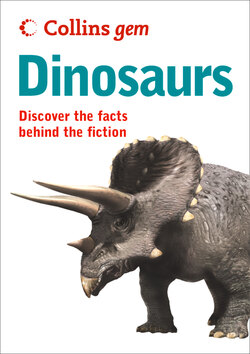Читать книгу Dinosaurs - Douglas Palmer - Страница 6
INTRODUCTION.
ОглавлениеTo most people, the word dinosaur brings to mind an enormous animal of awesome strength and ferocity. The name dinosaur means ‘terrible lizard’, and thanks to a constant deluge of dinosaur images in popular media, these amazing extinct animals have become perhaps the most iconic creatures in history.
What is less often apparent is the extraordinary diversity and variety of the dinosaurs. They were not all vast meat eaters and some resembled birds more closely than the reptiles we know today, with feathers rather than scaly skin. This introduction to dinosaur life portrays a selection of the dinosaurs we know most about, from the earliest ones, such as Eoraptor that lived around 228 million years ago, to the latest ones, such as Triceratops that became extinct 65 million years ago. We discover what they were like, where they lived, how they behaved, when they were first found and what the most recent discoveries tell us. Also included is information on what their names mean and how to pronounce them.
The popularity of dinosaurs has boomed since the early decades of the 19th century, when fossils of these extinct prehistoric monsters were first discovered and portrayed as once living animals. Yet despite the efforts of dinosaur experts over the last 200 years, we still have just a small sample – some 600 different kinds (genera) – of the total range and diversity of these remarkable animals, which dominated life on land for the best part of 100 million years.
As a result of this, many questions remain unanswered about how they lived, where they came from and how they were related to one another. For example, were the giant meat-eating theropods active hunters that chased down their prey, or were they scavengers who used their size to chase other meat eaters away from their kills? And did the giant plant-eating sauropods continue growing over a long period or did they grow faster than many of the large animals that are alive today? There is still much to be discovered, and who knows, maybe one day you will be the one to answer some of these questions.
